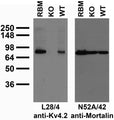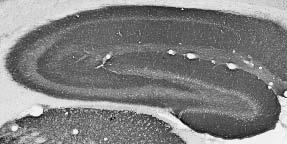Ships: 1-2 business days
Product Specific References for Applications and Species
| Immunohistochemistry: Mouse | ||
| PMID | Dilution | Publication |
| 37624696 | 1:200 | Zhao, M., et al. 2023. Osteopontin drives retinal ganglion cell resiliency in glaucomatous optic neuropathy. Cell reports, 113038. |
| 35952672 | 1:200 | Li, L., et al. 2022. Single-cell transcriptome analysis of regenerating RGCs reveals potent glaucoma neural repair genes. Neuron, 2646-2663. |
| 34131060 | 1:200 | Haddjeri-Hopkins, A., et al. 2021. Refining the identity and role of Kv4 channels in mouse substantia nigra dopaminergic neurons. eNeuro, . |
| 31017573 | 1:100 | Carrillo-Reid, L., et al. 2019. Mutant huntingtin enhances activation of dendritic Kv4 K+ channels in striatal spiny projection neurons. . Elife, e40818. |
| PLA: Mouse | ||
| PMID | Dilution | Publication |
| 31639389 | not listed | Kilfoil, P.J., et al. 2019. Metabolic regulation of Kv channels and cardiac repolarization by Kvβ2 subunits. . Journal of Molecular and Cellular Cardiology, 93-106. |
| Western Blot: Mouse | ||
| PMID | Dilution | Publication |
| 31639389 | 1:100 | Kilfoil, P.J., et al. 2019. Metabolic regulation of Kv channels and cardiac repolarization by Kvβ2 subunits. . Journal of Molecular and Cellular Cardiology, 93-106. |
| 24795561 | 1:1000 | Lugo, J.N., et al. 2014. Deletion of PTEN produces autism-like behavioral deficits and alterations in synaptic proteins.. Frontiers in Molecular Neuroscience, 27. |



![Immunoblot against crude membrane fractions from whole mouse (MBM) or rat (RBM) brain and from human hippocampus [HBM(H)], cerebellum [HBM(Cb)] or cerebral cortex [HBM(Cx)] and probed with L28/4 (left) or N52A/42 (right) TC supe.](http://www.antibodiesinc.com/cdn/shop/products/validation-image-73-361-l28-4-wb2_120x120.jpg?v=1626903294)


